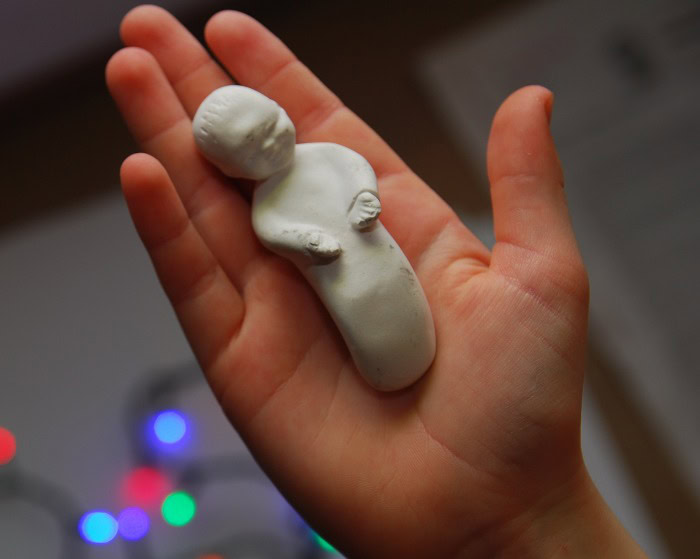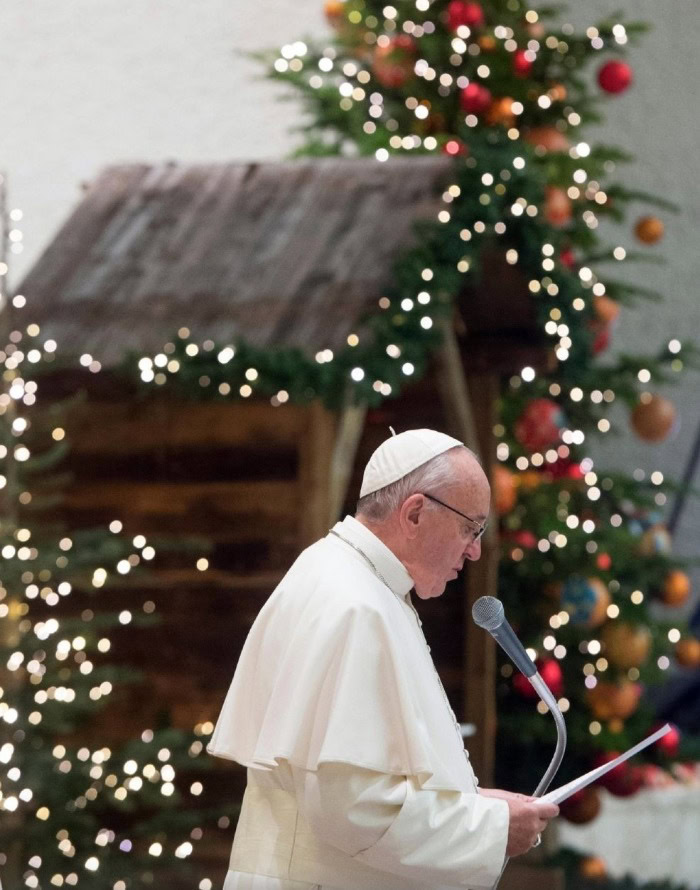
Times of crisis are times of grace. With this astonishing argument Pope Francis began his address to the Roman Curia (December 21, 2020) on the occasion of Christmas. And that was the first point: the contrast, we could say, between a culture of death and a culture of death. culture of life, which finds its center and fullness in the incarnation of the Son of God.
But, he continued, in order to capture, value and draw fruit from this event, certain conditions are necessary. It is necessary to "place" oneself in an appropriate locationThis happens "only if we are inert, humble, essential".
Faced with this "Christmas of the pandemic," Francis reflects once again on our situation: has been, he says, "an important test and, at the same time, a great opportunity to convert and recover our authenticity".
The Pope now takes up his proposal from that very special meditation last March 27 in St. Peter's Square: "an empty square, but full of a common belonging that unites us with every corner of the earth". This proposal, further developed in the encyclical Fratelli tuttiis none other than fraternity.
The pandemic has shown that we are in a storm together, because we are brothers. That is why it is important that we know how to dream together.

"May Christmas be for everyone an opportunity to rediscover the family as the cradle of life and faith; a place of welcoming love, dialogue, forgiveness, fraternal solidarity and shared joy, a source of peace for all humanity." Christmas Message from Pope Francis, December 2020
The second step of his speech is the meaning of crises.
The crisis is "the sieve that cleans the grain of wheat after the harvest". Crises, ultimately crises of faith or trust, were experienced by the important figures in the history of salvation: Abraham, Moses, Elijah, John the Baptist, Paul.
Thanks to their "crises" they were able to collaborate their place in God's plans. And so Francis also suggests, "each of us could find our place".
But the most eloquent "crisis" was that of JesusHis fasting in the desert, His prayer in Gethsemane, His abandonment on the cross.
The Church has had its crises yesterday and today, which have produced many scandals. But above all, shines the testimony and trust in the living God, which shines forth in the saints. (many of them "ordinary people" who are next to us).
Always, Francis observes, there may be those who look at the crisis without the light of faith and hope. But when we look at the Gospel in the right way, with faith and humility, we realize that "the Gospel is the first to put us in crisis".
And that "the time of crisis is a time of the Spirit", for we can have "the experience of a Grace hidden in the darkness. For gold is purified by fire, and those who please God, in the furnace of humiliation' (Yes 2.5).
Third, we are invited to distinguish "crises" from "conflicts".. "Crisis generally has a positive outcome, while conflict always creates a contrast, a rivalry", an antagonism apparently without solution, divides between the just and the guilty, generates closed groups that lose sight of the unity of reality and, in the case of the Church, the universality of the mission.
Every living body is in some way always in crisis.life requires some tension, but not conflict. So also the ChurchThe conflicts lead to the loss of richness and plurality, and confine some to others who are also confined.
That is why Francisco states: "The novelty introduced by the crisis that the Spirit desires is never a newness in opposition to the old, but a newness that springs from the old and always makes it fruitful".
And notice how Jesus explains it in a simple and clear way: "I am a man of the world.Unless a grain of wheat falls into the ground and dies, it remains unfruitful; but if it dies, it bears much fruit." (Jn 12:24). That is why we should not defend ourselves from crises in order to fall into conflicts, which would leave us alone and condemn us to sterility.
In defending ourselves from the crisis," he says, "we obstructed the work of the Grace of God that wants to manifest itself in us and through us". Certainly, he continues, it is necessary to recognize realistically the failures, the scandals, the sins, and therefore the need for conversion.
Because conversion speaks to us precisely about this ".need to die to a way of being, reasoning and acting that does not reflect the Gospel.".
And with that he returns to the "conditions" for grasping the newness that comes with Jesus Christ: "Only by dying to a certain mentality it will also make room for the newness that the Spirit constantly stirs up in the heart of the Church".
At this point he refers to St. Paul's letter to the Christians in Rome (cf Rm 12, 2), when he writes to them: "Do not adapt yourselves to the present world, but transform yourselves by renewing your mindso that you can distinguish what God's will isThe good, the pleasant, the perfect".
Once again, is the subject of conversion for discernmentThe "spiritual worship" that is the Christian life: offering and service to God and to one's neighbor.
Each crisis poses, in short, the need for a renewal, for a step forward, for a conversion. It is not a question, says the Pope with reference to the reform in the Church, of dressing the body of Christ in a patch (cf. Lk 5, 36-38), but to put a new garment on him; to put this new wine, which is always the grace of God, into new wineskins.
In the Tradition of the Church, which is like a living river in which the origins are always present, there are always new and old things (Mt 13:52).
"The 'old things,' Francis explains, are constituted by the truth and grace that we already possess. The new things are formed by the different aspects of the truth that we gradually come to understand". And quoting Mahler and St. Vincent de Lérins, he points out that the one who keeps us in that living dynamicity is the Holy Spirit.
If we allow ourselves to be guided by the Holy Spiritevery day we will get closer to "the whole truth" (Jn 16:13). On the contrary, without the grace of the Holy Spirit, we would deform the Church, making of it something merely human.
So, the Pope finally asks, what to do during the crisis? And he proposes the following protocol:
In short "the crisis is movement, it is part of the way".. "Conflict, on the other hand, is a false path, it is a wandering without aim or purpose, it is to remain in the labyrinth, it is only a waste of energy and an opportunity for evil." And the first evil to which conflict leads is murmuring, which locks us into self-reference and turns every crisis into a conflict.
Finally, with regard to service, he points out that our service should be directed especially to the poor and needy, to whom we are also to announce the Good News (cf. Mt 11:5).
Referring to Lévinas, Francis says that "he only truly knows God who welcomes the poor man who comes from below with his misery, and who, under this appearance, is sent from above.". And also that "we cannot see the face of God, but we can experience him when he turns towards us, when we honor the face of our neighbor, of the other who engages us with his needs" (cf. E. Lévinas, Totalité et infini, Paris 2000; Totalidad e infinito, Sígueme, Salamanca 2016.). In this way we can see God in the face of the poor.
Conversion from the realism of our poverty; conversion to fraternity, conversion to discernment. Trust in God, humility and courage to work and serve.
A good roadmap for managing crises (not just this one) and for living this pandemic Christmas.
Mr. Ramiro Pellitero Iglesias, Professor of Pastoral Theology at the Faculty of Theology of the University of Navarra.
Published in Church and new evangelization.